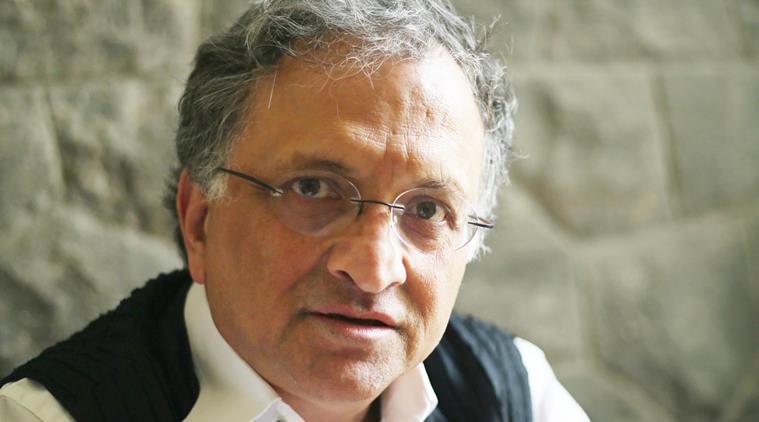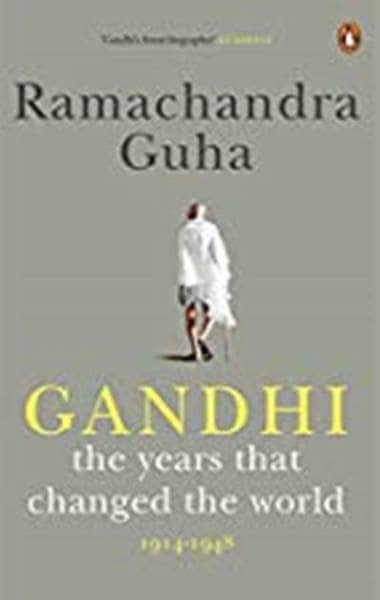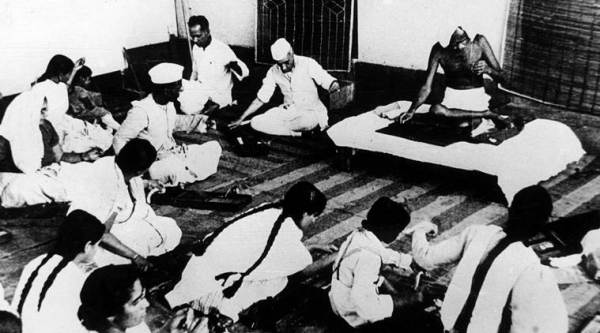RSS detested Ambedkar in his lifetime but now must praise him: Ramchandra Guha
Ramachandra Guha on the second volume of his biography on Mahatma Gandhi, the cost of criticising the incumbent government and why Dalits are a major political force today.

Ramachandra Guha (Express Photo/Tashi Tobgyal)
Ramachandra Guha on the second volume of his biography on Mahatma Gandhi, the cost of criticising the incumbent government and why Dalits are a major political force today.
Gandhi: The Years That Changed the World is the second volume of your biography. What aspects of Mahatma Gandhi’s life and politics did you wish to foreground in it?
This is a book based on many things apart from the Collected Works of Mahatma Gandhi. It draws on new material — a tranche of letters to Gandhi I found in the Sabarmati Ashram, government documents, intelligence reports, newspaper accounts, cartoons. I have tried to illuminate Gandhi from many perspectives.
One very crucial thing about the craft of biography, which not all biographers recognise, is the cast of secondary characters. Mahadev Desai, his self-effacing secretary, is central to this book. He was, in many ways, more important than Nehru and Patel. He was with Gandhi all the time. I hope I have been able to flesh out his character a little more. Then, there was Gandhi’s relationship with Saraladevi Chaudhurani, Rabindranath Tagore’s niece. People had written about their relationship before, but in a very prim way. But obviously, he was in love with her. And probably she was too. For at least a year, from late 1919 to late 1920, it was very intense. He was dreaming of her. He writes to her, ‘When are you coming back?’
Third, in this book, unlike older narratives, Ambedkar is much more important in Gandhi’s life than Jinnah.
How did Ambedkar’s critique lead to a change in Gandhi’s thinking on caste?
The first person to push him to re-examine his thinking on caste was Shree Narayana Guru and his temple-entry movement. This is something very important for any student of Gandhi to understand—his capacity to absorb, integrate and move on. You must never freeze him.
Ambedkar did push him and he recognised the force of that challenge. In 1933, he embarks on a countrywide anti-untouchability tour, which is largely ignored by his colleagues in the Congress. It was done because he was provoked and stunned by Ambedkar’s criticism. For him, that tour was as important as the Salt March three years before. And he was disappointed that it didn’t have that much of an effect.
In hindsight, was Gandhi wrong in having insisted Ambedkar agree to the Poona Pact?
It is undeniable that Gandhi coerced Ambedkar into signing the pact. The other part is more problematic. There is no clear answer in 2018 as to whether separate electorates would have helped Dalits. Separate electorates ghettoise you but they probably mean that you get the leader you want, not the leader upper castes want. But you don’t influence upper-caste voting. With joint electorates, Dalits are a major political force across the country today. The RSS detested Ambedkar in his lifetime, but Narendra Modi and the RSS have now to praise him and seek to coopt Dalits.
The Hindu right wing—then and now—blame Gandhi for Partition, and that’s why Nathuram Godse killed him. As a historian, do you think is an accurate assessment?
As a historian, I have documents on what the RSS was saying about him at the time. There is a section in the book where I quote MS Golwalkar saying, ‘We will have people like him silenced.’
Even sensible right-wingers don’t hold the view that Gandhi could have avoided Partition. The loss of life could have been minimised if Lord Mountbatten had not delayed it, if the exchange of administrative staff had taken place before the Parition, etc. Gandhi did all he could to keep Hindus and Muslims together. His martyrdom saved India. It horrified the Hindus, and it gave Muslims breathing space for some more time. And, of course, the Congress leadership was shamed into doing more. But that the RSS detested Gandhi, whether or not Godse was a freelancer or acting on instructions, is uncontestable.
The RSS and the BJP also cite Gandhi when it comes to their agenda of cow slaughter, and emphasis on Hindi.
Gandhi worshipped the cow, but he was absolutely clear that it should be absolutely voluntary, and no violence should be used against Muslims. On Hindi, he would have liked all of India to learn it, but he was totally committed to linguistic states.

How would Gandhi have responded to the violence of the contemporary cow protection movement?
Gandhi would have been appalled, and particularly at the Prime Minister’s silence on the violence by gau rakshaks (who should really be known as gau gundas). In a speech to the AICC in November 1947, he said that Christians and Muslims are completely equal in all respects to Hindus. He urged Congressmen to treat them as full citizens of independent India. This Nehru certainly did. But later Congress leaders were less steadfast in their support to religious harmony, and, of course, the ruling party today is even less committed to minority rights.
Gandhi is not seen as an ally by the contemporary Dalit movement.
Gandhi believed he could save Hinduism by eliminating caste distinctions. Ambedkar, based on his own bitter experience and based on his deeper historical and scriptural study of how Hinduism worked, thought that Gandhi’s view was naïve. He believed that caste was the core of Hinduism and the only hope for Dalits was to convert to another faith. This is a major difference.
But it’s not that Gandhi was a defender of the caste system. That is a lie, a deliberate ideological lie which many Ambedkarites have swallowed without studying Gandhi. Gandhi defended varnashsrama as an ideal in the 1920s but by the 1930s, he was not defending caste at all, either in theory or in practice. And from 1915, he was totally opposed to untouchability.
Also, this is very important for the historical record: Gandhi’s major critics were the Hindu right, who tried to kill him because he wanted to abolish untouchability.
What were the other differences between the two?
Ambedkar sees the state as the agency of reform, whereas Gandhi is suspicious of the state. And in hindsight, maybe Gandhi had something there. Because social reform must come from within too. Sadly, upper-caste reformers after Gandhi completely failed in attacking untouchability. Nehru and the Marxists talked more about class than caste. Vinoba Bhave, who is supposed to have inherited Gandhi’s reformist mantle, never led a movement against untouchability. They thought the Constitution has come, story has ended. Ambedkar did emphasise social reform, education and organisation of Dalits. On the other hand, Gandhi said upper castes had to continuously rid themselves of feelings of superiority. We can draw on both their legacies in positive ways today.
There is also one mystery. Ambedkar and Gandhi were bitter political rivals through the 1930s and 1940s. But then Ambedkar joins the Cabinet in post-Independent India. The conventional wisdom is that it was Gandhi’s magnanimity—and this is also mentioned by one or two biographers, based on no evidence. It is something I quoted in the past naively. As I show in the book, Rajkumari Amrit Kaur played a crucial role in getting Ambedkar into the Cabinet. It also had to do with Patel’s shrewd realpolitik: if you have Ambedkar on your side, you neutralise Jinnah. But the bridge was built by Amrit Kaur. And I speculate that for Ambedkar, dealing with a woman, who was herself from a minority community, not an upper-caste male like Gandhi and Nehru, might have helped.
What was the Congress party when Gandhi arrives in India? How did he transform it?
It was a party that operated mostly in English, comprised mostly professionals. And Gandhi transformed it. He built his image by identifying with peasants and workers. He recognised the importance of making it a mass movement. Operating in the vernacular was very important to him. In South Africa, he ran a journal in four languages—Tamil, Urdu, Gujarati and English. He must have been, to my knowledge, the first multilingual newspaperman in the world. (Tilak ran a newspaper in English and Marathi.) The diaspora experience enlarged him both in terms of religion and language.
Gandhi believed Indians and Hindus were a deeply flawed people. Was this as radical at the time as it is now?
It has to do with Gandhi’s view of religion. He believed that every religion is flawed, every religion had both good and evil. And the only way to redeem these flaws was to engage in dialogue with other faiths, to see yourself in the mirror. He did not think that the Vedas had the truth. Gandhi would have been appalled by the idea so beloved of the RSS that Hinduism is destined to be the vishwaguru of the world.
Gandhi lived and worked at the time of the rise of fascism across the world. How did he react to it?
Clearly, his way is different from Stalin’s and Hitler’s. He disliked the idea that one person would be so important that his word would be law. He was clearly naïve in thinking Hitler could be resisted via non-violence. But Gandhi repeatedly says that I am not infallible. And Ambedkar says in the Constituent Assembly that bhakti in politics is the route to dictatorship. The elevation of the individual above the nation, the equation of the individual to the nation—Ambedkar was wary that Indians were doing it about Gandhi; Gandhi was wary that Indians were doing it about himself. In that, they were both strikingly prescient.
What happens to Gandhian ideas on caste and inter-faith harmony as Hindutva becomes a stronger political force?
To those who defend democracy there are still some aspects to what he said that matter. On some things, he was absolutely correct. One, India cannot be a denominational Hindu state. While resisting injustice, you cannot use violence. I abhor the recent arrests of the human rights activists, but I am against Naxalism too. The struggle for caste and gender equality is ongoing. And he was truly precocious when it comes to the idea of environmental sustainability.
As Indian democrats today, we can learn from many people — Gandhi, Ambedkar, Tagore, Nehru, Rajaji, Kamaladevi Chattopadhyay. They are figures of the first half of the 20th century who speak to the first half of the 21st century.
Maybe, Nehru is least relevant today in terms of ideas. His greatness was that of personality. He understood how this nation should be held together. What he drew from Gandhi was linguistic and religious pluralism, and common decency: don’t demonise your opponents, take them along. He played a crucial historical role in keeping this country together and laying the foundations of democracy. We should be grateful for that. But in terms of ideas, you don’t need Nehru so much today.
At the same time, this cast of characters stood for a democratic, plural, egalitarian India, whom you can draw upon and who are totally opposed to the Golwalkar-Savarkar view of the world, and of the Lenin-Mao view of the world too.
Responding to the recent arrests of civil society activists, you said that Gandhi would have fought to defend Sudha Bhardwaj in court.
A lawyer working for Dalits, adivasis and workers, who has never committed an act of violence in her life. I have no doubt that he would have defended Sudha Bhardwaj, whether effectively or not, I don’t know. Ambedkar would have donned his robes too and he would probably have done a better job. In 1929, Gandhi had written against the law of sedition and said that when freedom comes, it will go. We are still debating it. This law is a millstone around our democracy. Unless you pick up a gun, you should not be arrested.
When did Gandhi first impact you?
When I read his autobiography as a college student, I remember being struck by his directness. Then when I was in Calcutta in the 1980s, I argued with Marxists about Gandhi. There was my encounter with the Chipko leader Chandi Prasad Bhatt, going to Gopeshwar and seeing him in his native heath, the work he had done—and going back to Calcutta and meeting people who were dismissing him as a bourgeois reformist. That’s when I started taking Gandhi very seriously.
Then, of course, in the late 1980s, I was living in Delhi, at the time of the Ram Janmabhoomi movement and the demolition of Babri Masjid. Living at the time of a great threat to the republic, and seeing what was happening to Gandhian ideals, I think that too led me to think more about him.
You have been a very vocal critic of the Narendra Modi government and the right wing. Have there been costs to that?
I am in a privileged position. I write in English, I have an international reputation. I live in a non-BJP state. Who knows what cost they pay who write in Gujarati and live in Gujarat? Or who write in Hindi and live in Uttar Pradesh? There have been no real costs but there have been some things which are more a reflection on this regime. For example, I was told I have been informally banned from the IAS academy because the directors are too nervous to have a Modi critic address the probationers. A high commissioner in a major country, who was in college with me, told a mutual friend that the IFS have been told not to meet me. I went to Japan and got a major award (the Fukuoka Prize ) along with scholars from other countries. All their ambassadors were there, but no representative from our embassy. And my phone is almost certainly tapped. But these are trivial costs compared to the harrassment that other and braver defenders of freedom face in our Republic today.






















 Mahatma Gandhi participating in a mass spinning ceremony on his 78th birthday in New Delhi (Express Archive)
Mahatma Gandhi participating in a mass spinning ceremony on his 78th birthday in New Delhi (Express Archive)
No hay comentarios:
Publicar un comentario